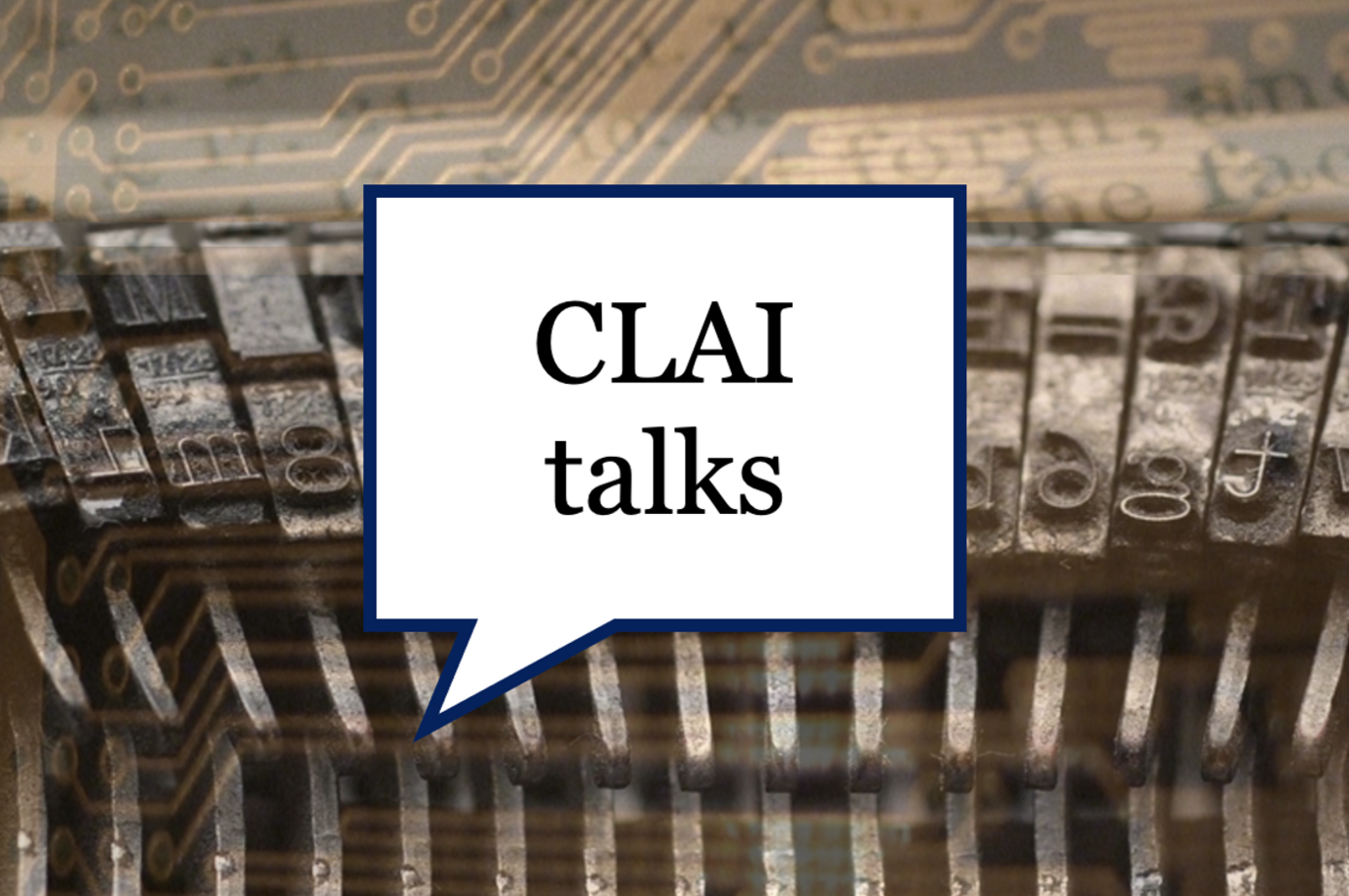CLAI talks autumn programme
Our online, bi-weekly CLAI-talks continue in the autumn of 2024. The full programme will be continually updated here.

The Center for Language Generation and Artificial Intelligence (CLAI) is happy to announce our bi-weekly talks of the autumn semester 2024. The talks by esteemed associated researchers will be open to the public and are given on Thursdays via zoom. They provide valuable insights into cutting-edge research and developments in the fields of language generation and artificial intelligence. All talks will take place online at https://aarhusuniversity.zoom.us/j/62020950492.
Program Schedule:
| August 29 | Christian Ulrik Andersen, Aarhus University, School of Communication and Culture A.I. – situated in colonial divides. Across scientific fields AI is implicitly understood as a Western phenomenon – applied e.g., in Western social media, building on Western use cases, and relying on notions of intelligence rooted in Western philosophy and science, and with historical ties to the development of a modernity intrinsically related to the colonization of the Global South(s). Big Tech’s use of the Global South(s) subjects and labor to both gather data and train models in unregulated settings is but one example of how these ties play out today. I this talk I will use Manthia Diawara’s film “African Intelligence” as an outset to raise a discussion of AI in the light of colonial divides, how it relates to dominant understandings of modernity (including ‘progression’ and ‘development’), and speculate on what alternative visions and studies of AI this might lead to. |
| September 12 | Bolette Sandford Pedersen, Copenhagen University, Institute for Nordic Studies and Language Towards a Danish Semantic Reasoning Benchmark - Compiled from Lexical-Semantic Resources for Assessing Selected Language Understanding Capabilities of Large Language Models I will present the semantic reasoning benchmark for Danish that we are compiling semi-automatically from a number of human-curated lexical-semantic resources, which function as our gold standard or ‘ground truth’. Taken together, our datasets constitute a benchmark for assessing selected language understanding capacities of large language models (LLMs) for Danish. More specifically, we focus on features such as semantic inference and entailment, similarity, relatedness, sentiment, and the ability to disambiguate words in context and interpret figurative language. The work is a collaboration between the Centre for Language Technology at UCPH and the Danish Society for Language and Literature. The project is funded by the Carlsberg Foundation. Note that this CLAI-talk will start at 14.00 |
| September 26 | Carsten Bergenholz, Aarhus University, Department of Management. A customized RAG chatbot for students Students are using various LLMs for educational purposes, yet the tendency of LLMs to hallucinate and make errors, can be worrisome for a teacher. However, RAGs can enhance the quality of chatbot outputs, by constraining how the answers are constructed. In this talk I present how a) we relied on Microsoft Azure to build a customized RAG chatbot for 550 Philosophy of Science students in the Spring 2024, b) we document the quality of the answers provided by the chatbot, and how c) students perceived and used the customized chatbot. Establishing how to optimize such offerings and what the boundary conditions are at the centre of our current attention, while we currently build similar large-scale RAGs for Organizational Behavior and Math courses. Presenter: Carsten Bergenholtz (in collaboration with Oana Vuculescu and Niels Lauritzen). |
| October 10 | Mads Rosendahl Thomsen, Aarhus University The current use of generative AI - and what could make it better?
|
| October 24 | Helene Friis Ratner, Aarhus University, Danish Schoold of Education Citizens’ data afterlives: Practices of dataset inclusion in machine learning for public welfare Public sector adoption of AI techniques in welfare systems recasts historic national data as resource for machine learning. In this paper, we examine how the use of register data for development of predictive models produces new ‘afterlives’ for citizen data. First, we document a Danish research project’s practical efforts to develop an algorithmic decision-support model for social workers to classify children’s risk of maltreatment. Second, we outline the tensions emerging from project members’ negotiations about which datasets to include. Third, we identify three types of afterlives for citizen data in machine learning projects: (1) data afterlives for training and testing the algorithm, acting as ‘ground truth’ for inferring futures, (2) data afterlives for validating the algorithmic model, acting as markers of robustness, and (3) data afterlives for improving the model’s fairness, valuated for reasons of data ethics. We conclude by discussing how, on one hand, these afterlives engender new ethical relations between state and citizens; and how they, on the other hand, also articulate an alternative view on the value of datasets, posing interesting contrasts between machine learning projects developed within the context of the Danish welfare state and mainstream corporate AI discourses of the bigger, the better. |
| November 7 | Daniel Hardt, Copenhagen Business School Ellipsis-Dependent Reasoning: a New Challenge for Large Language Models We propose a novel challenge for large language models: ellipsis-dependent reasoning. We define several structures of paired examples, where an ellipsis example is matched to its non-ellipsis counterpart, and a question is posed which requires resolution of the ellipsis. Test results show that the best GPT-3 models perform well on non-elliptical examples but struggle with all but the simplest ellipsis structures. I also report on current work with a variety of recent models, including GPT4. |
| TBA | Søren Pold, Aarhus University, School of Communication and Culture |
We invite you to mark your calendars and join us for these sessions.
For more information and updates on our biweekly talks, please check our website or follow us on LinkedIn or Twitter.
For media inquiries and questions, please contact: pascale.moreira@cc.au.dk
